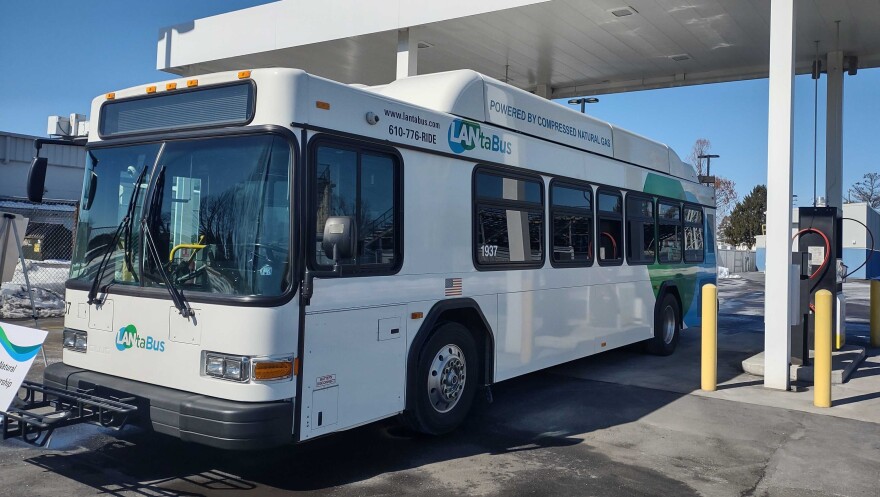ALLENTOWN, Pa. — With Pennsylvania's budget 11 weeks late and a transit deal appearing increasingly unlikely, Lehigh and Northampton Transportation Authority officials hope they'll be allowed to dip into capital funds to finance its Fiscal Year 2026 operation.
Last week, the state Transportation Department signed off on allowing SEPTA and Pittsburgh Regional Transit to dip into $394 million and $106.7 million of capital funds.
The deal lets PRT riders avoid fare hikes and service cuts while riders in Southeast Pennsylvania will see rates climb 21.5%.
LANTA Executive Director Owen O'Neil said he hopes a similar deal will be in the works for his organization.
"Obviously, I was hoping it would be resolved earlier than this. We're still hopeful that something will come out of" the budget negotiations."LANTA Executive Director Owen O'Neil
In an interview Monday, he said the Lehigh Valley's transit service will make a similar request to plug its own shortfall.
LANTA projects it will need $11 million to $12 million starting in January if it hopes to avoid service cuts and fare hikes.
"Obviously, I was hoping it would be resolved earlier than this," O'Neill said. "We're still hopeful that something will come out of" the budget negotiations.
Transit authorities throughout Pennsylvania have sounded alarm bells since last year that unless state lawmakers raised their funding in the 2025-26 budget, they would be forced to cut services, raise fares or both.
SEPTA's budget shortfall was so great that Gov. Josh Shapiro had to temporarily raid interstate highway funding to keep SEPTA afloat last November.
'They will not do that'
But the General Assembly has proven unusually divided during budget talks this year. The Democratic-controlled House passed a $50.6 billion budget plan in July that included greater funding for transit and basic education.
Meanwhile, the Republican-controlled Senate passed a $47.6 budget plan in August that largely kept funding levels flat.
Its plan proposed using Public Transportation Trust Fund money for operational costs; the money is intended to cover infrastructure needs such as new buses and vans.
“What I expect now is a final budget deal that will not include recurring funding for mass transit.”Gov. Josh Shapiro
Shapiro and House Democrats opposed the Senate's solution, leading SEPTA to cut services earlier this month.
Shapiro said his decision to use trust fund money is not the same as the Republican proposal, as the money he's allocated had not already been earmarked toward specific projects.
“What I expect now is a final budget deal that will not include recurring funding for mass transit,” Shapiro told Pennsylvania the Capital-Star last week.
“The Senate Republicans have made clear they will not do that.”
Sen. Majority Leader Joe Pittman said last week he is optimistic that removing transit from the conversation should allow all sides to coalesce around a budget deal.
However, it's unlikely to satisfy conservative wings of his caucus, who have demanded action on Pennsylvania's structural deficit.
"While I am encouraged by the meaningful work at the negotiating table, currently there is no global agreement on a budget deal, as several fiscal and policy issues remain outstanding," Pittman said in a released statement.
'Kind of holding out hope'
SEPTA and PRT, as the state's two largest transit authorities, have portions of the trust fund set aside specifically for their use, O'Neil said.
PennDOT then awards remaining funding to smaller authorities such as LANTA based on requests filed by those organizations, he said.
"If there is some kind of funding solution, we will be able to avoid really severe cuts. We're kind of holding out hope that something comes together."LANTA Executive Director Owen O'Neil
It remains to be seen whether smaller authorities such as LANTA, Susquehanna Regional Transportation Authority and Erie Metropolitan Transit Authority will receive packages similar to what SEPTA and PRT have secured.
Without a deal, LANTA will need to eliminate 20% of its fixed-route service and raise rates on its bus routes and LANTA Van services 25%.
"If there is some kind of funding solution, we will be able to avoid really severe cuts," O'Neil said. "We're kind of holding out hope that something comes together."
LANTA, which employs 306 people, had a total ridership of just under 4 million in Fiscal Year 2025, making it the third-largest transit authority in Pennsylvania.
While it traditionally serves Lehigh and Northampton counties, it's also under contract with Carbon County to run its transit program as well.


